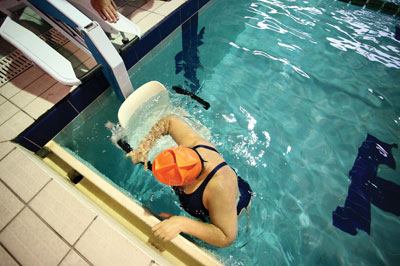Pool accessibility has become a hot topic in Washington, D.C.
The issue has received so much attention that Congress is considering legislation to further amend compliance and enforcement requirements of the Americans with Disabilities Act at public pools and spas. Two bills have been introduced as the U.S. Department of Justice granted an extension for compliance with the legislation. Concerned parties also were invited to meet with White House officials.
On March 26, Congressman Mick Mulvaney (R-S.C.) introduced a bill (H.R. 4256) calling for a one-year extension for compliance with the ADA pool-lift requirement. It also allows portable lifts and prohibits lawsuits against facilities for violations of “revised regulations for Titles II [municipal] and III, [including hotels, motels nonprofits, swim clubs and other such facilities] of the Americans with Disabilities Act” between March 15, 2012 and one year from the enactment date. The bipartisan bill, titled “Pool Safety and Accessibility for Everyone (Pool SAFE) Act,” has 26 original co-sponsors, including Rep. Ronald “Ron” Paul (R-Texas) and Rep. Mike Ross (D-Ark).
“Congressman Mulvaney believes portable lifts and shared lifts are the best solution…,” said his spokeswoman, Danielle McAdaragh. “It allows for lift accessibility and safety, as well as being more economically achievable. …”
Sen. Jim DeMint (R-S.C.) seeks to go one step further with a congressional bill (S. 2186) that he introduced with co-sponsors Lindsey Graham (R-S.C.) and Roy Blunt (R-Mo.) just prior to the March 15 deadline. If passed, it would prohibit federal government officials from enforcing the law with respect to public pools and spas.
“[The ADA standard] could lead to increased litigation and heavy fines that could force pools to close or raise fees …,” DeMint stated. “Pools with public access should have the flexibility to work directly with people with disabilities to accommodate their needs.”
As of press time, DOJ officials were considering whether to move the ADA compliance deadline back a full six months to Sept. 17. The extension announced on the day of the original deadline for pools and spas — March 15 — gives pool operators until May 21.
The postponement followed lobbying efforts by the aquatics and hotel/lodging industries, and other stakeholders, and was an effort to “allow additional time to address misunderstandings among pool owners and operators regarding these ADA requirements,” according to a DOJ notice. A public comment period, which ended April 4, was set to gather opinions about the longer delay.
Jennifer Hatfield, director of government affairs for the Association of Pool & Spa Professionals, expressed initial support for the provision in the Mulvaney bill that allows for portable lifts. It addresses the concerns raised when the DOJ issued an interpretation of the ADA’s 2010 Standards for Accessible Design restricting the use of portable lifts. The interpretation states that ADA Title III facilities may use portable lifts that meet the 2010 standards only if a fixed lift is not “readily achievable.” For Title II (municipal) facilities, the DOJ said sharing a portable lift between multiple pools is not permitted unless it would result in undue burdens to provide equipment at each one. Furthermore, the DOJ said portable lifts must be available and operable during all hours that the pool is open to the public.
APSP is part of an alliance of aquatics organizations and manufacturers asking the agency to reconsider the interpretation. The group, which includes S.R. Smith, theNational Swimming Pool Foundation, Spectrum Aquatics and Aqua Creek Products, was present at a March meeting in which representatives shared their positions with White House officials. A number of stakeholders attended, including representatives from the U.S. Chamber of Commerce, the hotel and lodging industry, and the World Waterpark Association.
“We’ve been involved in the process from the get-go, and nowhere was it ever suggested that lifts should be fixed elements,” said John Caden, accessibility specialist at S.R. Smith in Canby, Ore. “As an industry we don’t agree with [the DOJ interpretation]. It has a lot of disadvantages. Our fear as an industry … is that the lifts are going to become an unintended play hazard.”
Ultimately, pool industry experts say they want maximum accessibility, but representatives of the disabled community have a different view of the issues regarding compliance. They’ve waited 22 years since the ADA’s original passage. A six-month extension would mean another summer when many pools aren’t required to be accessible. “It’s sort of a terrible spring break [announcement],” said Lara Schwartz, vice president of external affairs at the American Association of People with Disabilities, based in Washington, D.C. “… We don’t like that there’s an extension, and job one is to work against that on every front. …” The AAPD also plans to reach out to the business community to build greater understanding.
Hatfield affirmed that the aquatics industry will continue reaching out to DOJ officials and lawmakers. The group plans to use grass-roots strategies and formal channels; however, she believes it will be an uphill battle to get any legislation passed. “It’s an election year, so there is less time,” she said.
She and other experts recommend that pool operators continue to take steps toward compliance.
“Make this your highest priority,” said John McGovern, president of Recreation Accessibility Consultants, LLC, in Hoffman Estates, Ill. “Do an access audit, pay attention to everything else [such as locker rooms] and get your [equipment] order in as soon as is possible.”



